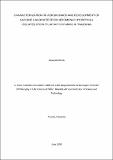| dc.contributor.author | Mzula, Alexanda | |
| dc.date.accessioned | 2020-09-23T09:22:18Z | |
| dc.date.available | 2020-09-23T09:22:18Z | |
| dc.date.issued | 2020-06 | |
| dc.identifier.uri | https://dspace.nm-aist.ac.tz/handle/20.500.12479/941 | |
| dc.description | A Thesis Submitted in Partial Fulfillment of the Requirements for the Degree of Doctor
of Philosophy in Life Sciences of Nelson Mandela African Institution of Science and
Technology | en_US |
| dc.description.abstract | Tanzania produces less than half of the country annual demand in fish. Therefore, there is an
urgent need to produce more fish, particularly through fish farming. However, aeromonads
infections cause major lose in aquaculture worldwide and especially in developing countries,
including Tanzania, lacking advanced capacity for fish disease control and prevention. Poor
fish farming management practices, lack of data on prevalence, emergence of resistances to
commonly used drugs, drug residues and limited capacity to control aeromonads bacterial
infections emerged as major health problems in fish farming in Tanzania. This study aimed to
characterise the aeromonads species circulating in fish farms and then develop a monovalent
vaccine candidate from selected prevalent aeromonads specie for supporting tilapia fish
farming improvement in Tanzania. A cross sectional study was conducted in Ruvuma,
Mbeya, Iringa and Kilimanjaro regions between February 2017 and October 2018. A
questionnaire was administered to 32 selected fish farmers to explore their knowledge on
pond, fish health and diseases management practices. The results showed that the selected
farmers had limited knowledge on pond, fish health and disease management practices. Onfarm
training
on the same to these farmers would improve their knowledge. A total of 816
whole fish samples were aseptically collected from these 32 fish farms to detect and identify
aeromonads using molecular methods in order to establish the prevalence and characterise
their virulence properties. The overall prevalence of 24.6% was recorded. Seventy five
percent of the isolates had virulence genes of varying combinations and the in-vivo study
showed high mortality (98.3%) to isolates with more virulence genes indicating their capacity
to establish disease in a favourable environment. The Aeromonas hydrophila strain TZR72018
was
selected and attenuated using a novel thermo-continuous sub-culturing method to
develop a vaccine candidate. The experimental study was carried out to assess its protective
efficacy. The results showed that the vaccine candidate had acceptable protective efficacy of
82.3% and 71.4% when given through intraperitoneal injection (IP) and immersion (IM);
respectively. To the best of my knowledge this study reports the development of thermoattenuated
and stabilized A. hydrophila vaccine candidate for the first time in Tanzania or
elsewhere. | en_US |
| dc.language.iso | en | en_US |
| dc.publisher | NM-AIST | en_US |
| dc.rights | Attribution-NonCommercial-ShareAlike 4.0 International | * |
| dc.rights.uri | http://creativecommons.org/licenses/by-nc-sa/4.0/ | * |
| dc.subject | Research Subject Categories::NATURAL SCIENCES | en_US |
| dc.title | Characterization of aeromonads and development of vaccine candidate from aeromonas hydrophila isolated from tilapia fish farms in Tanzania | en_US |
| dc.type | Thesis | en_US |


